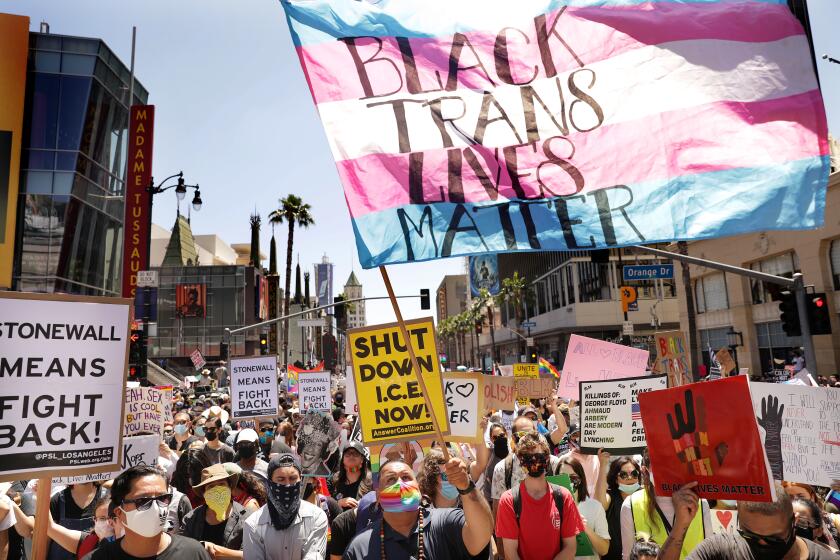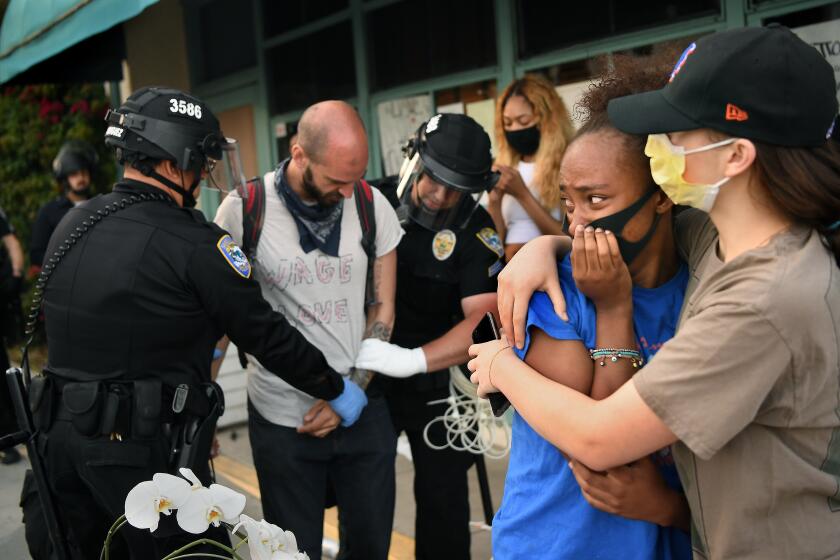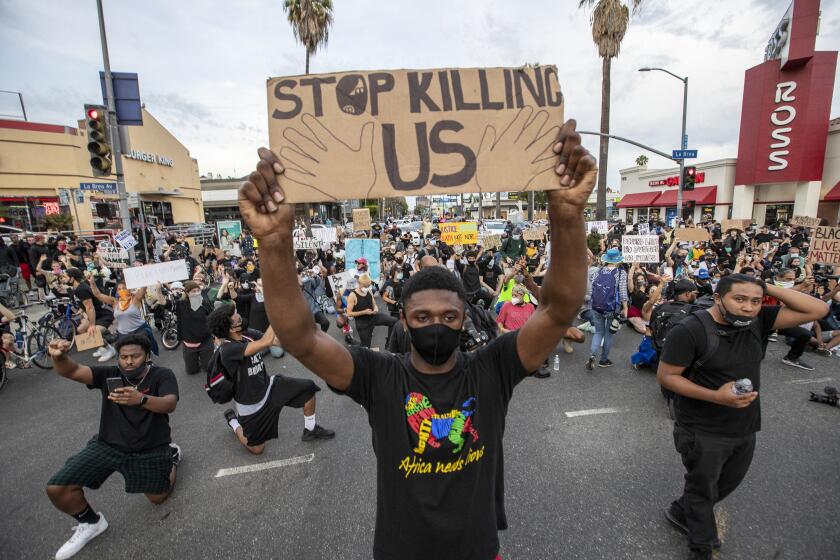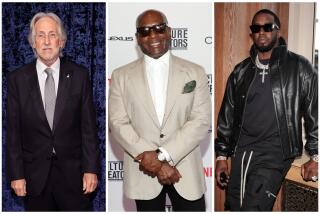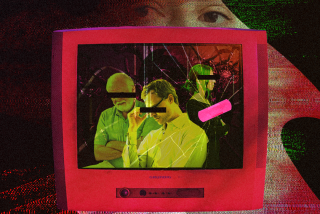White celebs rush to amplify Black Lives Matter. The results are mixed to embarrassing
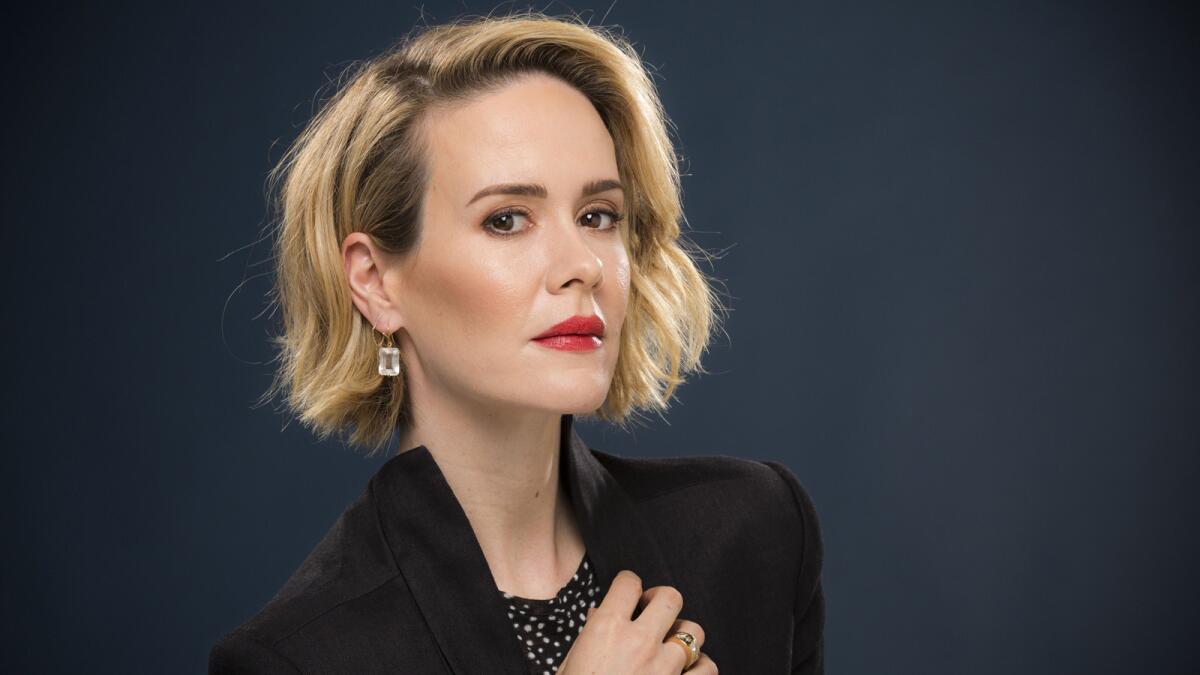
- Share via
White celebrities, influencers, commentators and just regular folks are having a prolonged and very public deer-in-the-headlights moment.
As protests against racism and police brutality continue to grow in every state and around the world, white people with media platforms (including me) find themselves caught between the Scylla of silence and the Charybdis of potential cringe call-out.
As the video of George Floyd’s death under the knee of Minneapolis Police Officer Derek Chauvin sent hundreds of thousands into the street to protest, many celebrities, some of them white, spoke out. Amid the early coverage of these protests, which focused primarily on violence and property damage rather than peaceful demonstrators, many of these advocates then found themselves being denounced for supporting violence.
As the media shifted focus and made it clear that the protests were vastly peaceful, more stars in entertainment and social media began denouncing police brutality and supporting Black Lives Matter. Those who couched their support in a call for an end to violence, which implied that the protesters were to blame for that violence, were often called out; those who said nothing were criticized for their silence.
Last week, #BlackoutTuesday turned into a big fail when social media influencers and stars redefined “the least I can do” by filling their social media platforms with black boxes. The initiative, designed to target the music industry, was created by two Black music marketers who asked that music platforms like Spotify, Apple and TikTok cease operations for a day to show support for the community that in many ways created them. When a much larger array of people participated, adding #BlackLivesMatter and #BLM to their posts, the barrage of black boxes ended up drowning out activists and organizers, many still engaged actively in protesting.
In the fallout even beloved activist Emma Watson got slammed for participating in what many saw as, at best, an ill-conceived effort that ultimately silenced Black voices and front-line reports from protests.
The ‘All Black Lives Matter’ march was organized by the Black Advisory Board, made up of Black LGBTQ+ leaders and organizations.
Social media influencers, many of them young and inexperienced at addressing issues outside their personal lives or whatever niche they had established, were encouraged to use their platforms to support the protests and Black Lives Matter, and those who did not were told that if they didn’t have anything constructive to say, they should stop saying anything at all. (Causing many to rethink the definition, and necessity, of “influencers.”)
Late-night hosts, who often act as cultural first responders during times of crisis, were among the first caught in those headlights. Jimmy Fallon apologized for appearing in blackface for a 2000 “Saturday Night Live” sketch and invited NAACP President Derrick Johnson on to “The Tonight Show” to discuss the damage such portrayals have caused. Jimmy Kimmel took the bull by the horns and addressed the depth of his own white privilege, while Stephen Colbert condemned the violent tactics many police have used during the demonstrations.
But there is no getting around the fact that, with the exception of Trevor Noah, late night is, and always has been, a bastion of whiteness.
Which is why Noah’s own early response to the protests — “Think about that unease that you felt watching that Target being looted,” Noah said. “Try to imagine how it must feel for black Americans when they watch themselves being looted every single day” — and his recent insistence that Joe Biden define “police reform” have been so powerful.
More recently, a group of high-profile white women, including Sen. Elizabeth Warren, Hillary Clinton, Julia Roberts and Gwyneth Paltrow, turned over their Instagram accounts for #SharetheMicNow, while another group of white celebrities participated in a video PSA in which they each vow to “Take Responsibility” for their complicity in our country’s systemic racism.
The results were mixed to embarrassing. The concept of “sharing the mic” is fine as far as it goes, and one hopes that followers of the white famous women will become followers of the Black not-as-famous women. But that kind of amplification only works if it is sustained — i.e., Black women get big mics of their own. As for the “Take Responsibility” video, well, even in these Zoom-conditioned times, it is virtually impossible to watch without cringing.
White people who want to be allies need to worry less about the George Floyd protests and more about the systemic racism that sparked them.
But criticizing the participants, or their choice of eyewear, is not helpful either. When folks like Aaron Paul and Bryce Dallas Howard were asked if they wanted to join with the NAACP for this PSA — aimed at making white people who proudly identify as non-racist recognize their implicit role in a racist society — were they supposed to say no? Bryce Dallas Howard, who has publicly excoriated “The Help,” a movie she starred in, for being white-centric and not the thing to be watching now — was she supposed to say no?
How can you refuse to be in a PSA against racism?
You can’t. As many have suggested since the PSA’s airing, you could take care not to impose a “white savior” ethos on your remarks, but you can’t ask for final director’s cut. So you just do the best you can and sit quietly while everyone slays you for it. You listen to the criticism, don’t take it personally, and then do better next time.
Because there has to be a next time. Or a first time. As a white person, you cannot expect emoji hearts and applause whenever you speak out against a system from which you have benefited, unintentionally or not. Yes, you may have to screw up your courage to do it, but that doesn’t make it an inherently courageous act. Speak out because it is right, and because the survival of this country and your immortal soul depend on it.
Fear of being called out or “misunderstood” or being seen as “political” isn’t a legitimate excuse. Staying silent because you’re afraid you’ll put your foot in your mouth is even worse. If you don’t know how to discuss racism at this point, it’s time to learn, even if it means learning through your mistakes. Yes, you may be judged on Twitter, but freedom from being judged on Twitter is not a constitutionally guaranteed right; freedom from being brutalized by law enforcement and/or unlawfully detained is.
During the #MeToo movement, many men felt very uncomfortable, caught between a legitimate desire to support women and the defensive need to point out that not all men are predators — wanting terrible people to be punished but also worried that #MeToo was going too far, denouncing too wide a swath of behavior.
But complaints about being uncomfortable and arguing that it was “a few bad apples” didn’t stand then and doesn’t stand now; most police officers may not actively engage in racist abuse, just as most movie executives may not actively prey on the women around them. But the culture is designed to protect the bad apples — to, in some cases, reward the bad apples. So if you’re not willing to dismantle that culture, then you are part of the problem.
Consumed with anger, fear and dread after the killing of George Floyd, Californians can take action to address structural racism.
If you need talking points, watch Ava DuVernay’s “13th”; that’ll make you good and uncomfortable and also mad as hell. Decisions were made, policies enforced when most of us weren’t looking that created a situation most of us don’t support. We have to start looking harder, and speaking out more, if only to point to the words of people better equipped to articulate the problem and the solutions than we are, and say: “What she said. What he said. That is what needs to happen. That is what I believe. That is what I want too.”
Years ago, a friend of mine lost her father unexpectedly, tragically. We were all very young and many of us had no idea how to help her through that terrible time. Years later she told me, “I don’t remember anything that anyone said, but I do remember the people who didn’t say anything.”
It’s hard. We’re all self-involved and insecure and limited by our personal experience and it shows. But don’t be one of those people who doesn’t say anything.
If you are a person with a public platform, or even if you are not, you need to speak out. Thoughtfully and without fear of failure, because the only real failure at this point is silence.
More to Read
The biggest entertainment stories
Get our big stories about Hollywood, film, television, music, arts, culture and more right in your inbox as soon as they publish.
You may occasionally receive promotional content from the Los Angeles Times.
